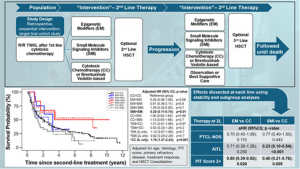A study offers promising guidance for treating relapsed/refractory (R/R) mature T and natural killer (NK)-cell lymphomas (TNKL)—a group of aggressive blood cancers with poor prognoses and no current standard of care (Figure 1). The study identifies an optimal treatment sequence that improves survival: second-line small molecule inhibitors followed by third-line epigenetic modifiers.

Figure 1: Graphical abstract. In relapsed/refractory T-cell/natural killer-cell lymphomas, patients often cycle through cytotoxic chemotherapy (CC), epigenetic modifiers (EM) or small-molecule inhibitors (SMI) empirically. Ideal therapy at each line remains unknown. In this retrospective, multiple intervention, ‘target-trial’ using the PETAL global cohort, these drug classes were compared sequentially across second followed by third line (12 possible treatment scenarios) using classical and machine learning causal inference methods. At second line, benefit was especially evident in AITL and high-risk (prognostic index for T-cell lymphoma [PIT] score ≥2) populations. Small molecule inhibitors followed by epigenetic modifiers improved survival compared to most other strategies.
- Best Survival Sequence:
- Second-line: Small molecule inhibitors
- Third-line: Epigenetic modifiers
- Significant Outcome:
This regimen led to markedly better overall survival than repeated chemotherapy or other sequences - High-Risk Subgroups Benefited Most:
Especially patients with angioimmunoblastic T-cell lymphoma
Patients with R/R TNKL face limited and often ineffective treatment options. The absence of an established treatment protocol forces clinicians to make complex, individualized decisions with little evidence-based support. This study provides the first clear sequencing strategy that could guide practice and future clinical trials.
This study is a step forward in transforming relapsed T/NK-cell lymphomas from terminal illnesses into manageable conditions by tailoring therapies based on treatment sequence rather than trial-and-error chemotherapy.
Journal article: Sorial M.N., et al. Forecasting optimal treatments in relapsed/refractory mature T-and NK-cell lymphomas: A global PETAL Consortium study, British Journal of Haematology.
Summary by Stefan Botha










